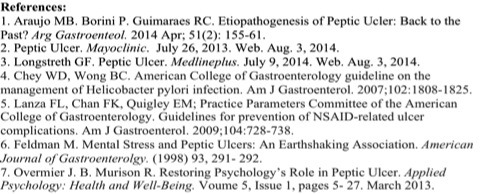Sage is here to help.
Feel like you could be eating better? Not sure what to change or where to look? Sage Nutritious Solutions make it easy for you to discover the wide, wonderful world of balanced, healthy, bangin' food.
Peptic Ulcers: Myths + Nutrition Tips
Peptic ulcers are open sores that occur in the stomach or duodenum (the first section of the small intestines) of the gastrointestinal tract when the stomach lining has been compromised by strong stomach acids. The lining protects your GI tract from the acidic environment needed to digest food, however if the lining becomes damaged, you are at risk for developing an ulcer. Some common misconceptions that people believe cause peptic ulcers include consuming too many spicy foods and stress. Stomach ulcers can be the result of Helicobacter pylori bacterial infection or long-term use and abuse of NSAIDs (nonsteroidal anti-inflammatory drugs) such as ibuprofen and aspirin. Even though stomach ulcers are not the result of stress or eating too much spicy food, stress and certain foods can make current symptoms worse.
Peptic ulcer symptoms range from mild to severe. If you experience a burning stomach pain between meals or at night (that may last briefly or for hours) and may occur every so often or more frequently - you might be experiencing a peptic ulcer. Antacids may alleviate the burning sensation but are only a temporary "bandage" and will not heal an ulcer. If you think you might be suffering from a peptic ulcer you should seek medical attention immediately so that your doctor may diagnose the root cause and prescribe the appropriate treatment for you (treatments are similar to GERD and can be seen in our article HERE). Peptic ulcers will worsen if not treated and can put you at risk for further health complications such as internal bleeding, infection, and scar tissue. These complications can affect the body’s ability to digest food properly and wreak havoc on appetite. Scar tissue within the gastrointestinal tract will inhibit the digestive system from absorbing nutrients and passing food along just like a roadblock. Peptic ulcers can have a negative impact on your nutritional status and overall health, which is why seeking the appropriate treatment, is essential.
The cause and effect relationship between stress and peptic ulcers has not been established, however it is clear there is an association. Although stress does not cause peptic ulcers, if experiencing stress from injury or emotional strain might very well aggravate peptic ulcer symptoms. This may be due to hormonal responses and or other psychological factors. Treating and reducing stress in correspondence with peptic ulcer treatment is beneficial for the overall healing and recovery process.
Simple nutrition tips can help lessen the pain of peptic ulcers. They include avoiding alcohol, spicy foods, and acidic foods. Alcohol, spicy and acidic foods can exacerbate the pain caused by peptic ulcers by decreasing the pH and putting further stress on the damaged areas of the gastrointestinal lining. Spicy peppers, tomatoes, and citrus fruits are examples of the types of foods to avoid. Greasy, fatty foods may also increase the acidity of your gastrointestinal region and should be avoided if they intensify symptoms. Incorporating more fruits, vegetables, and whole grain in your diet is a good idea. Fruits, vegetables, and whole grains are naturally abundant in vitamins and minerals that contain beneficial and healing properties. It is also advised to discontinue smoking and avoid use of NSAIDs. Because each individual’s symptoms may vary, it is important to speak with your physician and dietitian before attempting to self-treat or diagnose.
Happy Eating!

Alexandria Wolz, Cooperative Intern for:
